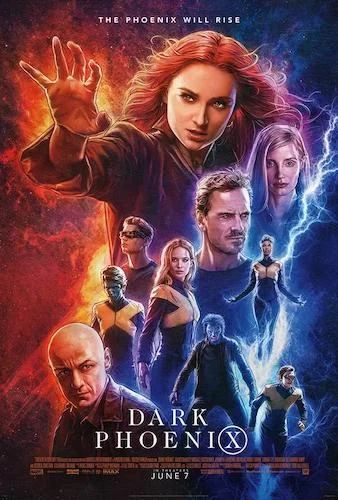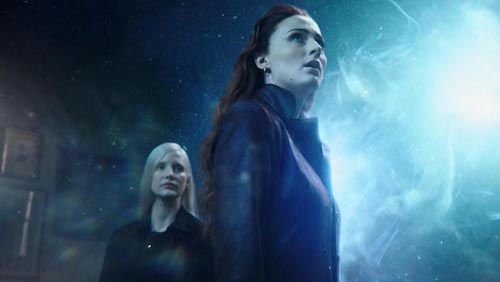Dark Phoenix
I remember when X-Men: First Class was first announced. It seemed like the worst idea at the time. A prequel film to the original X-Men trilogy we just had? The trilogy that ended really badly? That one? Getting a prequel? No. Thank. You. It was going to be a bit, boring, overindulgent mess. 2011 came along, and wouldn’t you know that First Class was actually pretty good. We had the mutant mythos tied to some huge historical events (concentration camps, the Cuban missile crisis, etc.). We had strong performances. This was looking good.
Then, it got even better. Days of Future Past (by far the best X-Men film so far) unites the past series with the current one in a bold and spectacular way. This was going to also be a trilogy. How could something so ambitious (and successfully so) be topped? Well, it wasn’t. Apocalypse tried even harder but began to fall flat. It was slightly a self-parody, with the amount of effort put into the film. At least it tried, though. We still got some interesting special effects. QuickSilver got to save the day again (in a scene for Future Past, but he saves all of Apocalypse and makes it at least worth a shot for his scene alone). Then, it was announced that the series wasn’t done yet. Dark Phoenix wasn’t going to be a spinoff like the Wolverine films were. Speaking of those films, it’s interesting to note that this may be one of the rare times where a trilogy got better as it refused to die (Wolverine: terrible. The Wolverine: eh. Logan: fantastic). Maybe Dark Phoenix was going to send the series in that bizarre direction. Maybe it was going to be better than Apocalypse. It had to be, right?
Jean Grey and Vuk secretly know the answer.
Dark Phoenix has confirmed something for me. This is it. This is what I was expecting from First Class all those years ago. This is the exhaustion of a tired franchise, not the spark that revamped it. This is the refusal to truly wrap up a story (it’s technically the end, but it still has flashes of what will be. We’re four, I mean seven, I mean twelve films in. Logan ends with some true finality, and some glimmers of hope. Dark Phoenix thinks it ends the same way, but it really doesn’t. Part of the problem is that this one off tale functions as a quick character arc for the title character (Jean Grey, otherwise), but for the rest of the X-Men stories, it’s just a quick anecdote. Logan was about Wolverine, and served as a conclusion to his trilogy (and his works in all X-Men films). This is almost an anecdote. That’s no way to end a series.
It acts that way, particularly because it is so boring. As a part of this long running series, it’s the same damn argument we’ve heard a billion times now. Use your powers for good. The world hates you. Back and forth. We get it. Some mutants want vengeance, some want acceptance. This idea gets a catalyst in the form of a a rescue that goes right, but a subsequent opportunity goes wrong. We can do good, but others forcing me to be this way is bad. Powers can be good, but they can also accidentally be bad. That’s nice and all, but the entire rest of the film is an eternal struggle that we’ve heard twelve times now. Twelve. In films that are hours long. Enough, already. Use a different angle. In First Class and Future Past, it becomes more than this eternal conflict. Even Apocalypse was. Basing this entire film mostly around one X-Men member as narrowed down the focus to an underlying theme, turning it into the sole focus. That was a terrible idea that makes for glacial storytelling at this point of the series.
It’s too bad, because Sophie Turner is great in the role, and I also wish she was in better X-Men instalments (I guess Apocalypse counts).
As a stand alone film, this also doesn’t work. So much history is kept in the previous films, that any newcomers will be confused beyond belief. Why does this magnet guy hate the super genius so much? You can make this argument for something like The Return of the King, which absolutely needs the two other The Lord of the Rings films to work. The difference is, at least The Return of the King is still sensational. Dark Phoenix is super serious to the point of dry rawness. The film takes this route, yet tosses in weak comic book film jokes, and they all fall flat. I get the reason why the film goes dark. It’s the final revelation of arguably the most powerful character in this series. The choice of which side wins is ultimately hers. It all leads to this. I do get this.
Yet it just does not work. Everything here feels like it could have worked if a more experienced director was behind the camera. Simon Kinberg has never done this before. Ryan Coogler didn’t just make Black Panther. He worked his way up with experience in various cinematic fields, specifically as a director. Apply this logic to Taika Waititi, the Russo Brothers, Christopher Nolan, and more. You expect the end of a series of this magnitude to go well by a first timer (no disrespect, of course)? It isn’t just about being kind to someone who may have it. This entire film is held back by tonality issues. That’s why it’s dreadfully boring. That’s why it’s moments of severity are melodramatic. That’s why it’s campy. These are fine lines that were pranced on and effectively toyed with in earlier instalments. Even Apocalypse was somewhat encouraging of its own corniness in a self aware way. Dark Phoenix and its question of morality mirror how the film was handled. A big task was handed over to someone to make the right choices. In the film, Jean Grey struggles internally but finally gets there. In real life, Dark Phoenix was completely mishandled to the point of oblivion.
Andreas Babiolakis has a Masters degree in Film and Photography Preservation and Collections management from Ryerson University, as well as a Bachelors degree in Cinema Studies from York University. His favourite times of year are the Criterion Collection flash sales and the annual Toronto International Film Festival.






